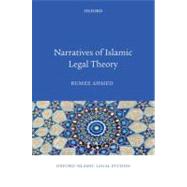
Note: Supplemental materials are not guaranteed with Rental or Used book purchases.
Purchase Benefits
Looking to rent a book? Rent Narratives of Islamic Legal Theory [ISBN: 9780199640171] for the semester, quarter, and short term or search our site for other textbooks by Ahmed, Rumee. Renting a textbook can save you up to 90% from the cost of buying.
| Introduction | p. 1 |
| From God's Speech to Islamic Law: Defining the Qur'an | p. 17 |
| The Miraculousness and Inimitability of the Qur'an | p. 19 |
| The Clear and the Ambiguous in the Qur'an (Muhkamat Wa Mutashabihat) | p. 32 |
| Brief Review | p. 46 |
| The Abrogating and the Abrogated (Al-Nasikh Wa-al-Mansukh) | p. 49 |
| Conclusion | p. 67 |
| Re-creating the Prophetic Model: Hadith as the Gateway to the Sunna | p. 73 |
| Multiple-Chained Transmissions (Mutawatir) and Well-Established (Mashhur) Transmissions | p. 77 |
| The Single Transmission (Al-Khabar al-Wahid) | p. 84 |
| Brief Review | p. 94 |
| Abrogation of the Qur'an through the Sunna | p. 96 |
| Conclusion | p. 109 |
| The Limits of Considered Opinion (RaÆy): Analogy and Precedent | p. 113 |
| The Bedrock of Qiyas: Determining the Ratio Legis (æilla) | p. 115 |
| Taqlid of the Mujtahid | p. 129 |
| Taswib of'the Mujtahid | p. 137 |
| Conclusion | p. 145 |
| Conclusion | p. 149 |
| Appendix | p. 159 |
| Bibliography of Arabic Sources | p. 165 |
| Bibliography of Non-Arabic Sources | p. 167 |
| Index | p. 171 |
| Table of Contents provided by Ingram. All Rights Reserved. |
The New copy of this book will include any supplemental materials advertised. Please check the title of the book to determine if it should include any access cards, study guides, lab manuals, CDs, etc.
The Used, Rental and eBook copies of this book are not guaranteed to include any supplemental materials. Typically, only the book itself is included. This is true even if the title states it includes any access cards, study guides, lab manuals, CDs, etc.